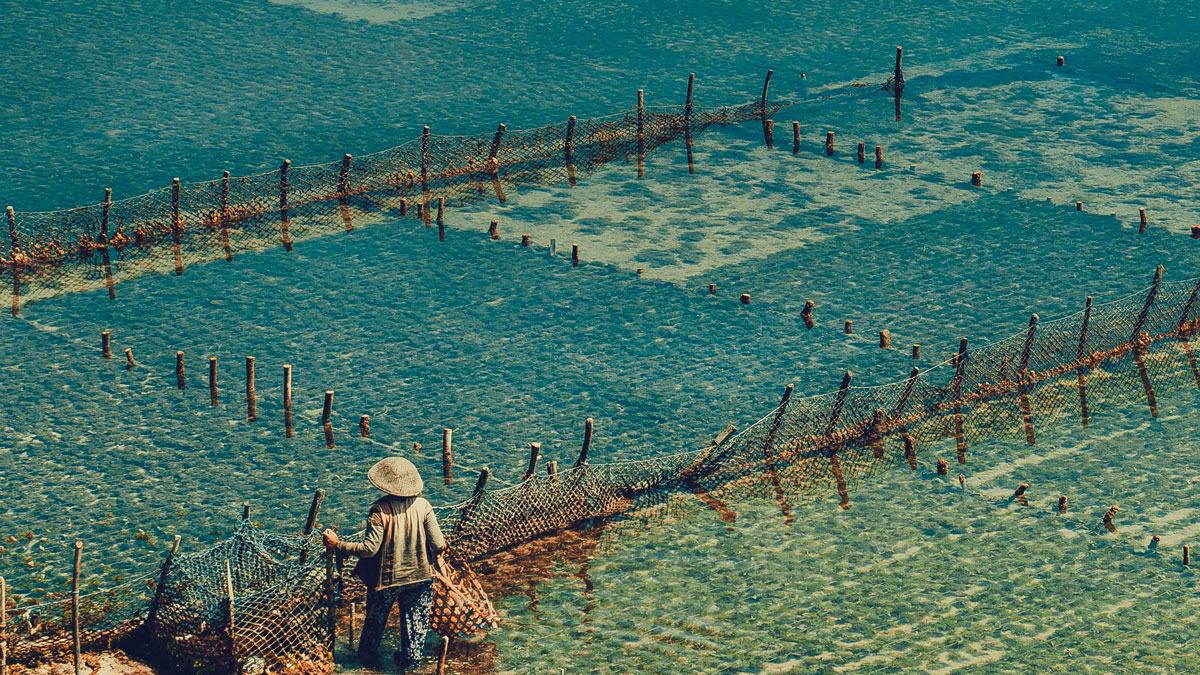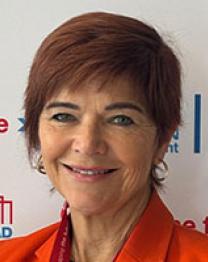
UN Trade and Development (UNCTAD), UN Global Compact, the Global Seaweed Coalition, and FAO organized a speakers’ corner event titled, “An ocean of opportunities: The potential of seaweed to address food security, environmental sustainability, and gender empowerment” on 12 July at the FAO Headquarters in Rome, Italy. Main speakers were Chantal Line Carpentier (UNCTAD) and Vincent Doumeizel (UN Global Compact). Their presentations explained how seaweed, a versatile marine macroalgae, is rapidly gaining recognition for its multifaceted contributions to food security, sustainability, and gender empowerment.
Seaweed production for both food and non-food purposes, reached a record of 36.5 million tonnes in 2022, mostly from Asia, with the United Republic of Tanzania, Chile, and the Russian Federation leading in other continents. In value, the global market for seaweed has more than tripled over the last two decades, growing from $5 to $17 billion with global imports representing about $1.2 billion. International trade in seaweed and its by-products only represents 14 per cent of this value, indicating significant potential for sunrise industries.
Seaweed is also a great food source. Seaweed is good for animals as feed, and it has the potential to serve as a bio stimulant and replace fertilizer. Some seaweed can also grow extremely fast. The fastest variants can grow up to 40 centimeters per day to reach 60 meters high. Though seaweed forests are disappearing, we can regrow a forest in a few months while we need decades on lands.
Environmentally, seaweed is the sea farming activity with the lowest environmental impacts as it does not need fresh water, fertilizers, or land, while providing environmental services such as absorbing carbon and filtering water system. Moreover, seaweed farming can provide ecosystem services such as carbon sequestration to mitigate climate change, nitrogen cycling, and ecosystem restoration.
Socially, seaweed offers the potential to empower women. In many developing countries, women cultivate and process seaweed as a complementary economic activity in fishing communities to add to family income and food security. Indeed, women represent 40 per cent of starts up in the sector where the sector is still informal.
To increase seaweed production and use in ways that keep benefitting people and the planet, the speakers offered the following recommendations:
- Encourage governments to incorporate seaweed into national development, biodiversity, and climate mitigation plans, including the next round of NDCs.
- Support countries in delimiting ocean space, providing permits, and facilitating access to finance and technology for harvesting and post harvesting treatment of specific target species and uses.
- Further research on various seaweeds’ carbon sequestration potential, biosecurity risks, nutritional benefits. We can also support science and domesticate seaweed.
- Advocate for global definition and harmonization of seaweed standards and related food and non-food products safety and security regulations.
- Create a transparent market for seaweed by defining marketable species, by-products, and market prices.
- Advance research and development of promising seaweed-based foods, nutraceuticals, cosmetics, pharmaceutical and non-plastics substitutes product development in developing countries, especially among women and vulnerable coastal communities.
- Support the creation and recognize associations of producers and harvesters as social solidarity entities that can receive dedicated support.
- Enable collaboration in this highly fragmented and very nascent industry.
Seaweed is a versatile marine macroalgae that is increasingly gaining recognition for its multifaceted contributions to development, environmental sustainability, food security, and gender empowerment. The global seaweed market is valued at approximately $17 billion, with exports reaching $1 billion in 2021 (UNCTAD, 2023).
Seaweed uses span various areas, including human food consumption and industrial sectors such as hydrocolloids and pharmaceuticals. The ocean crop is also used in environmental projects such as non-plastic substitutes, carbon capture and renewable energy sources like biofuel. Seaweed can also offer sustainable solutions to help improve livelihoods in developing countries, particularly for poor coastal communities. It can rapidly regenerate and supports ecosystem restoration. Women play a significant role in seaweed production, processing, and commercialization.
However, much of the seaweed sector’s economic, environmental, and social potential remains untapped and remains greatly unregulated. During a time of multiple food security, environmental and social challenges, sustainable development of emerging ocean economic sectors such as seaweed takes on a new urgency. Despite its multiple and multifaceted contributions to sustainable development, seaweed has historically been underrepresented in the public sphere.
Speakers' Corner
A "Speakers' Corner" will be set up at the 36th Session of the Committee on Fisheries (8-12 July 2024), to allow participants to share perspectives, approaches, and solutions for sustainable aquatic food systems. This seaweed event will be hosted by Chantal Line Carpentier (UNCTAD) and Vincent Doumeizel (UN COMPACT & GSC), with the aim of presenting the state-of-the-art analysis of the opportunities that seaweed could bring to address food security, environmental sustainability, and to empower women in this sector.
Outcome
The expected outcome of this event is enhanced understanding by FAO member states of seaweed’s potential as a regenerative solution to improve food security, environmental performance, livelihoods, especially for women, and to address multiple global crises. That understanding would underpin growing international public debate and dialogue on the trade policy, development, and science interphase, including the need for designing a United Nations coordination and capacity creation mechanism for the sector.

Dr. Carpentier, from Quebec, Canada, is Head of Trade, Environment, Climate change, and Sustainable Development Branch of UNCTAD’s Division on International Trade and Commodities (DTIC). Her work with governments and partners foster green, blue, circular, and impact economies that supported by trade, are key to addressing the triple planetary crisis: climate change, pollution and biodiversity loss. She came to Geneva after leading the UNCTAD New York office, representing the SG and coordinating UNCTAD’s support to inter-governmental negotiations of the UN General Assembly (2015-2023).
She held several other positions. At the UN Department of Economic and Social Affairs, she facilitated the engagement of NGOs, women and youth’s groups, business, local authorities, etc. in the SDGs negotiations and the UN Rio+20 Conference (2011-2015). She also supported the Commission on Sustainable Development research and negotiations on sustainable agriculture and sustainable consumption and production (2007-2011).
Prior to joining the UN, she Headed the North American Free Trade Agreement Commission for Environmental Cooperation’s, Environment, Economy and Trade Division (2000-2007), was Agro-environmental policy analyst for Winrock International (1998-2000) and post-Doctoral fellow/Brazil office manager for the International Food Policy Research Institute (1996-1998).
She has a PhD. in Agro-Environmental Economics from Virginia Tech, as well as a MSc. and BSc. in Agro- Economics from McGill University and is an ironman and ultramarathoner. She is a Yale World Fellow, received the 2023 Schwab Foundation for Social Entrepreneurship public intrapreneur award, and is a UNEP Who’s Who of Women and the Environment.
Vincent Doumeizel is Senior Adviser on the oceans to the United Nations Global Compact as well as director of the Food Programme at the Lloyd’s Register Foundation.
A self-described optimist and global citizen, Vincent has in recent years devoted himself to promoting a food revolution and environmental solutions based on sea resources, especially seaweed. Vincent leads the charitable objectives of the Foundation through the funding of innovative projects to drive safety in the food supply chain.
Partnering with the UN, FAO, World Bank, WWF, universities, NGOs and large brands, Vincent released the “Seaweed Manifesto” and now co-leads the Global Seaweed Coalition with the objective to scale up the seaweed industry safely in order to address some of the world’s most important challenges, such as hunger, global warming, pollution and poverty.



